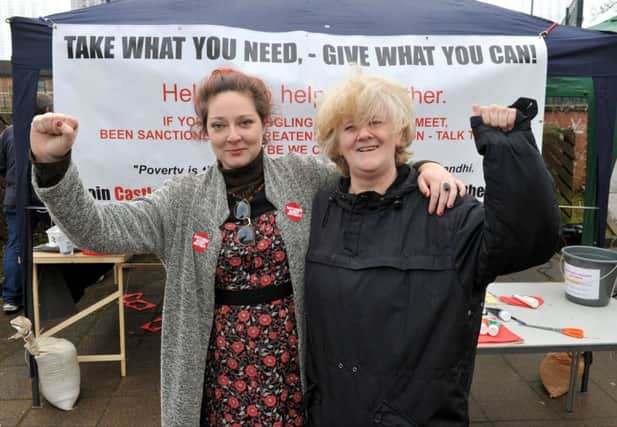Darren '˜Loki' McGarvey: Campaigners have edge on careerists


Castlemilk is a district on Glasgow’s south side which was developed as a housing scheme in the 1950s. Schemes, like high-rise flats, were one of many solutions proposed to accommodate working-class families relocating from the slums after the Second World War.
But as we all know, the promise of the scheme was never fulfilled.
Advertisement
Hide AdAdvertisement
Hide AdIn fact, for many it quickly turned into a living nightmare and by the 80s had become synonymous with crime, drugs and violence.
The anger and scepticism that built in communities like Castlemilk, over successive decades, became a volatile cultural energy, oscillating between anger and apathy, that many movements have since tried to politicise – in the hope of appropriating it for their own electoral ends.
However, this sudden interest in the daily lives of the working-class always seems to peak in the run-up to an election or a referendum, after which, it peters out – and this has been duly noted by locals often considered as lacking the sophistication to do politics right. In fact, the often cynical party politics of post-referendum Scotland is fast becoming the central tenet of a new strategy taking root in working class communities, like Castlemilk, which is based on a fundamental rejection not only of Tory austerity, but the political pantomime that is post-referendum Scotland.
“I’m not a politician”, says Cathy Milligan, a 53-year-old community activist who grew up in Castlemilk. Cathy will soon run as an independent in the local elections this May. She, along with a core group of community activists, founded Castlemilk Against Austerity in the aftermath of the independence referendum.
The fact that Cathy is not a politician is currently her biggest asset. Political figures are not highly regarded in communities like this, for good reason, whereas Cathy is viewed locally as a woman of the people. She is not only visible in the area she hopes to represent but also fluent in the local language and customs; often regarded as too coarse, vulgar, offensive or abusive by politicos and activists who parachute in looking for scraps of political capital. Cathy is intuitive, not only to the day-to-day concerns of locals, but also how people express those concerns and how the disparate challenges the community faces can coalesce in apathy, anger and, increasingly, racism and xenophobia.
“The root of racism is austerity”, says Cathy, unambiguously. “People on benefits turn against others on benefits. If you’re backed into a corner it brings out the worst in you. As human beings, we know how to make things better for each other but the economics of austerity stops all that. We’re under the cosh and we’re fighting for our lives.’’
What makes her so endearing – and compelling – is that her intelligence is not marshalled in service of reappropriating local anger for her own ends, but rather she represents a nurturing, caring force that encourages people to rediscover their self-belief and take responsibility for the upkeep of their own community. She says: “We’re not saying we have all the answers. But we’re smart enough to figure it out. We believe in each other and we believe in the community.’’
In the coming month, Castlemilk Against Austerity is running a variety of campaigns and events that take a holistic view of community needs and aspirations. Whether it be the solidarity programmes aimed at reducing the social stigma associated with food poverty, leaflets designed to push back against racism and xenophobia in the community, or seminars about the impact of bullying, they are charging on with a healthy lack of concern for the cynical agendas of political parties or activists jockeying for banner positions at anti-Trump rallies.
Advertisement
Hide AdAdvertisement
Hide AdIn fact, talk of Trump and Brexit is viewed here as an irrelevant distraction. At a recent screening of I, Daniel Blake, legendary Glasgow poet and Govan-based philosopher, Robert Fullerton – who speaks the sort of lowland Scots you’ll never read in The National – clipped me around the proverbial ear for mentioning Donald Trump during a panel discussion. “Are you out there, Trump?” he joked, gesturing as if to shout out the door, perhaps alluding the perma-tanned egotist’s role as a bogey-man for left-wing groups desperate for some political traction in SNP-land.
Robert, as eloquent a public speaker as you are likely to hear, believes the obsession with Trump and Brexit – as well as Yes/No – has become just another distraction from the struggle taking place in his community.
Addressing a packed hall in Kinning Park, he didn’t mince his words: “The problem with our politics right now is none of us are doing it. It’s no’ good enough to go up the road after this event, thrilled at what’s been said. You’ve got to go and do it. My back is killing me tonight, I’ve lost my inhaler and I’m short of breath, but that never stops me walking slow – to where the battle is.”
It’s the sort of powerful, heartfelt rhetoric that brings up the hairs on your neck, that politicos, up and down the spectrum have tried – and failed – to mimic.
CAA, who have just launched a crowdfund to raise a modest £1000 to fight the local election, will likely be shouted down by a section of the Yes movement, drunk on its own algorithm, which can only think and speak in the dead language of armchair political strategy.
However, when faced with the sheer depth, weight and authenticity of the message Cathy and Robert are carrying, I suspect those who would usually sneer from behind a keyboard will likely bow their heads for fear of drawing their gaze.
You can support them now: https://www.justgiving.com/crowdfunding/VOTE-CATHY